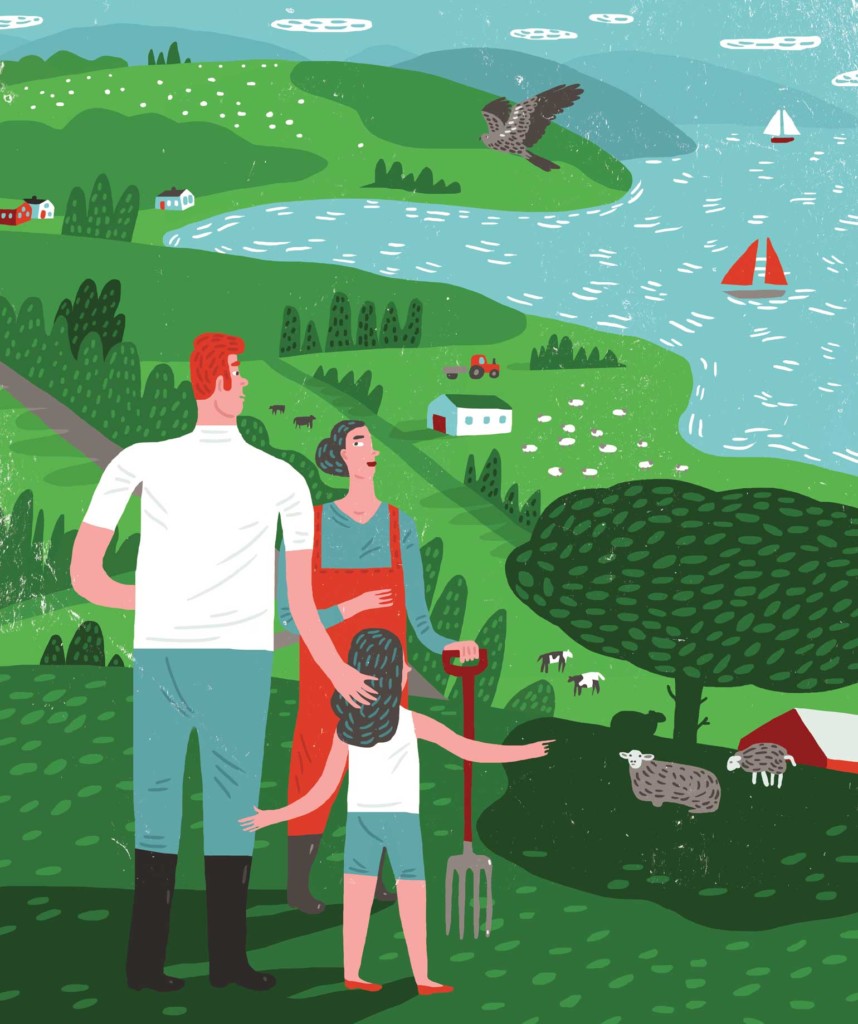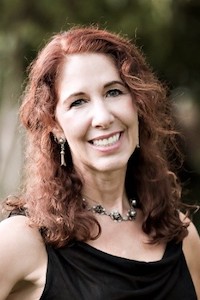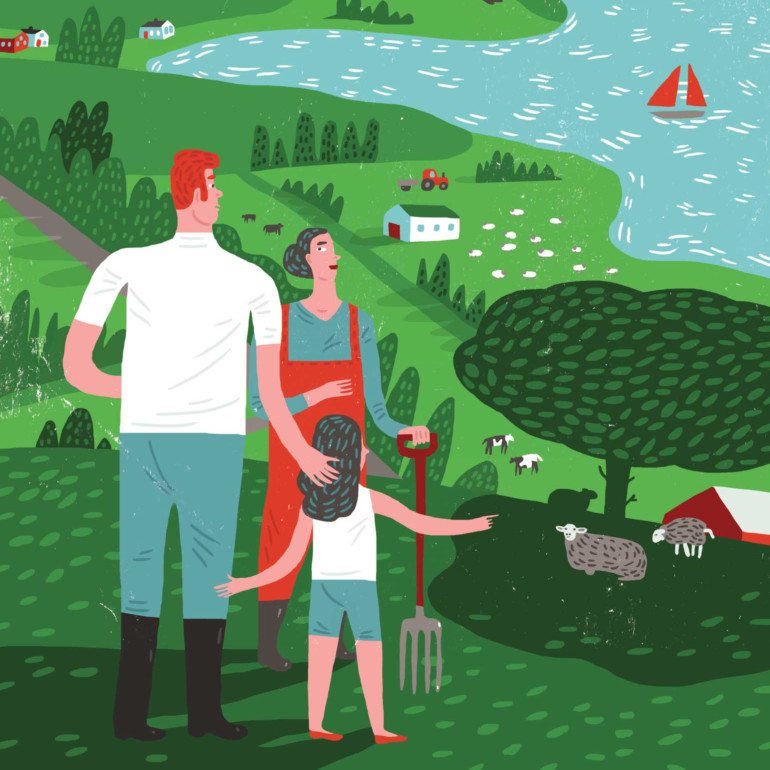
IT WAS IN THE 1850s, with the Gold Rush winding down and California’s mission-based land grants dismantled, that Marin County’s first farm families began to arrive. Mostly immigrants from Italy, Switzerland, Ireland and the Portuguese Azores, they established small herds of cattle and sheep on Marin’s oak-studded hillsides and coastal bluffs, undeterred by rocky soil and ocean fog.
And almost immediately they were successful. By 1862, Marin was providing 25 percent of all California’s butter, and by 1950 there were 200 dairy ranches here. There was plenty more, too: Point Reyes became known for peas and dry-farmed artichokes, Tomales for potatoes, and a flower industry thrived as well.
But that was before the 1970s, when development fever hit and roads and suburbs sprawled — by 1982 the Bay Area had lost more than a fourth of its farmland. And it was before the past three decades, when large-scale agriculture slowly sapped the life out of family farms across the U.S, sending younger generations fleeing for more lucrative — and secure — livelihoods. The average age of American farmers has risen steadily and now hovers close to 60.
That trend, though, is reversing in Marin, where the youngest generation of Marin’s longtime ranching and farming families is returning, often with new plans. Alongside the traditional ranches, or on lands leased from them, first-generation farmers with an experimental mindset are finding different ways to make a living off the land. “From the outside it might look like not much is changing, but from the inside there is a lot of innovation involved,” says Moira Kuhn of Marin Roots Farm.
Their success shows in the numbers. According to the most recent Marin Crop and Livestock report, agriculture in the county had a gross value of $87 million in 2017. Of this, 35 percent was from livestock and another almost 40 percent from livestock products, so ranching is still the main money-maker. But while produce accounted for just $4 million, it’s the fastest-growing component, up 18 percent from the previous year.
Marin’s farms feed the culture in other ways, defining this as a health-conscious, vibrant locale. “When you look at the latest news and analysis about the livability of communities, one indicator of desirability is the presence of organic farms,” says Marty Jacobson of Allstar Organics. “They become part of the fabric of the community and the identity of a region.”
A key player in the salvation of local farming is MALT (Marin Agricultural Land Trust), a member-supported nonprofit that helps farmers hang on to their land by purchasing agricultural conservation easements. Founded in 1980 by a coalition of ranchers and environ- mentalists who overcame their traditional differences to work together, MALT crafts lease agreements under which farmers agree never to subdivide or develop their land for other uses, in return for which they receive funds they can reinvest in their businesses. As of 2018, MALT has aided more than 85 farming families and preserved more than 53,000 acres of farmland. And it doesn’t stop there; in 2018 MALT announced a goal of protecting a total of 100,000 acres — nearly all of Main’s remaining private farmland — from nonagricultural development by 2040.
More recent supportive initiatives include the Marin Carbon Farming Project, which teaches and funds sustainable practices to improve the rate at which carbon dioxide is removed from the atmosphere and stored in soil, a process known as sequestration. Fencing off creeks, planting trees, composting and rotational grazing are all practices that enterprises like Toluma Farms, Stemple Ranch and Straus Family Creamery are using to boost carbon sequestration and contribute to the fight against climate change.
Founded in 1983, before farmers markets were common in towns across the U.S., Marin’s Thursday and Sunday markets at the Civic Center, along with others that followed, are another big reason farms continue to thrive. “Demand for local food has been increasing over time, and farmers markets allow shoppers the ability to buy directly from growers,” points out Andy Naja-Riese, director of education for the Agricultural Institute of Marin, which runs the Civic Center markets and others in the Bay Area. “Meanwhile, farmers and producers are able to have really incredible margins, getting 90 cents or sometimes even 100 cents on the dollar of what they sell.”
The path ahead, though, is not so clear, as the Bay Area’s economic boom brings higher land and labor costs. “As wages continue to rise each year in California, we’re facing a huge deficit in profit,” says Sierra Miller of Paradise Valley Produce. “The only way we can keep going is to increase our food prices. This is a major threat to a farm of our size.” Farmers who don’t own their land are particularly vulnerable, and some are looking farther north and east for future leases.
Still, they remain committed. “Every day I say a prayer of gratitude that I’m able to continue my family’s dairying legacy here in Marin,” says sixth-generation rancher Marissa Thornton Silva of Silva Family Dairy. “And I’m making it my mission to instill that same appreciation in the next generation, starting with my own kids.”
15 Farms to Know About
➽ ALLSTAR ORGANICS
Farmers Marty Jacobson and Janet Brown
Location Nicasio, leased from Nicasio Valley Ranch
Main products Heirloom tomatoes and other produce
Innovations Jacobson and Brown grow produce and edible flowers, which are featured in two of Cowgirl Creamery’s seasonal cheeses, Pierce Point and Devil’s Gulch; they also sell dried herbs and created a line of herbal salts, sugars and aromatic flower waters.
➽APPLEGARDEN FARM
Farmers Jan and Louis Lee
Location Tomales
Main products Farmstead hard cider
Innovations First-generation farmers for whom this is a second career, the Lees purchased grazing land from the former Cerini Ranch and planted it with heritage apples, choosing dwarf varieties for low-water usage. They sell AppleGarden cider to local restaurants; all pressing, fermenting and bottling are done on the farm, which also offers weekend tours, tastings and B&B stays.
➽ BARINAGA RANCH
Farmers Marcia Barinaga and Corey Goodman
Location Tomales Bay
Main products Wool and lambs
Innovations Known for their farmstead sheep’s milk cheeses, the farmers shut down their cheesemaking operation in 2016 and began focusing on wool production, adding Corriedales and Romneys, known for high-quality fleece, to their flock. Breeding and lamb sales are also in the mix.
➽ CLARK SUMMIT FARM
Farmers Liz Cunninghame and Dan Bagley
Location Tomales
Main products Pastured pigs, grass-fed cattle and lambs, free-range laying hens, occasionally turkeys
Innovations After growing up on the farm with a herd of dairy cows, Cunninghame switched to organic meat production. They sell to farmers markets and restaurants but prefer selling direct to consumers “on the hoof” — making a quarter, half or whole animal available by order in coordination with a local butcher shop.
➽ DOLCINI RED HILL RANCH
Farmers Brother and sister Doug and Kitty Dolcini and Doug’s children John and Annie Dolcini Mount
Location Petaluma
Main products Traditional and grass-fed beef, pasture-raised eggs
Innovations In addition to the Marin Farmers Market, the Dolcinis now sell to Andy’s Markets, Scotty’s Market, Cowgirl Creamery and Farmer Joe Market in Oakland as well as restaurants. They also lease land to organic farms County Line Harvest, La Tercera, and Moonfox Farm and grow organic feed.
➽ FARMER JOY
Farmers Joy and Greg Dolcini
Location Chileno Valley
Main products Free-range duck eggs, pastured chicken eggs, 100 percent grass-fed beef, natural pork and honey
Innovations In 2010, Farmer Joy started selling eggs by email and now also markets duck eggs directly to consumers via Farm Fresh to You (a Community Supported Agriculture subscription service) and the online delivery service Good Eggs. Other outlets are farmers markets, distributors and restaurants.
➽ JENSEN FAMILY RANCH
Farmers Bill and Eileen; Jim and Christine
Location Tomales
Main products Lambs and wool
Innovations A sixth-generation Marin rancher and one of the last to maintain a full herd of sheep, Jim Jensen with his father Bill still keeps 300 Dorset-Sussex cross ewes and their lambs, as well as grazing cattle. Jim has a day job with MALT and works with conservation partners such as Fibershed, a supporter of sustainable textiles.
➽ LAFRANCHI RANCH, NICASIO VALLEY CHEESE COMPANY, NICASIO VALLEY FARM
Farmers Rick, Scott and Randy Lafranchiand families
Location Nicasio
Main products Organic cow’s milk, organic farmstead cow’s milk cheese, pasture-fed organic chicken eggs and the Nicasio Valley Farms Pumpkin Patch every October
Innovations As fifth-generation ranchers and the third generation on their current farm, the Lafranchis are the only organic farmstead cow’s milk cheesemaker in California and now the only dairy in Marin with a pumpkin patch. They have also expanded their poultry operation and now sell eggs.
➽ MARIN ROOTS FARM
Farmers Jesse and Moira Kuhn
Location Petaluma
Main products Peas, beans, root vegetables, artichokes, squash, strawberries and a wide variety of greens
Innovations Bay Area natives, the Kuhns apprenticed on other farms before starting their own and have expanded slowly to lease three plots in West Marin and Petaluma, selling specialty organic vegetables to restaurants and farmers markets.
➽ MARIN SUN FARMS
Farmers David Evans and Claire Herminjard
Location Petaluma and Point Reyes Station
Main products Organic and grass-fed beef, lamb, goat, pasture-raised pork, chicken, duck, rabbit, veal and water buffalo
Innovations After 20 years in business, Marin Sun Farms has developed a fully integrated system to get from pasture to delivery, which includes their own butcher shops. They sell organic mature beef in a line called Mindful Meats.
➽ PARADISE VALLEY PRODUCE
Farmers Sierra and Blake Miller (daughter and son-in-law to Sandy and Dennis Dierks)
Location Bolinas
Main products Greens, root vegetables and other cool-weather produce
Innovations One of the first organic farms in Marin County, Paradise Valley was pioneer- ing from the start. New generation Sierra and Blake have continued to hone organic techniques developed by Sierra’s father, Dennis Dierks, while introducing simple machinery to reduce hand planting time. They’ve also increased outreach to their customers via an active presence at farmers markets, on a new website and on social media.
➽ ROSSOTTI RANCH
Farmers Julie and Tony Rossotti
Location West Marin and Petaluma
Main products Pasture-fed, sustainable veal and goats, limited duck and chicken
Innovations With the tagline “nine generations,” Julie and Tony Rossotti represent the proud fifth and fourth generation, respectively, of the Grossi and Corda ranching families. But they took their own path, branching into production of humanely raised veal, in which calves are pasture fed until the age of six months. In addition to selling to many top Bay Area restaurants, the Rossottis this year launched an online store, Grotto Rossotti, to sell direct to consumers and ship sustainable meats around the country.
➽ SILVA FAMILY DAIRY
Farmers Marissa Thornton Silva and Louis Silva
Location Tomales
Main products Organic Jersey cow’s milk
Innovations A descendant of the founding Marshall family and a sixth-generation farmer, Marissa reintroduced cows to her family ranch, starting her own Jersey herd with the help of a Kickstarter project. She and husband Louis now have 100 Jersey cows and sell the milk to Straus and Tomales Farmstead creameries.
➽ STAR ROUTE FARMS
Farmers Annabelle Lederink, farm manager
Location Bolinas
Main Products Organic specialty vegetables
Innovations Founded in 1974 by Warren and Amy Weber, Star Route Farms is the oldest continuously operating certified organic farm in California. The University of San Francisco purchased the farm in 2017 and plans to continue operations while using it for agricultural education.
➽ TOLUMA FARMS AND TOMALES FARMSTEAD CREAMERY
Farmers Tamara Hicks and David Jablons (owners); Christian and Ashley Coffey (farm manager and head cheesemaker); Skyler Bentley (herd manager) and Jenny MacKenzie (cheesemaker)
Location Tomales
Main products Sheep and goat milk cheeses and organic cream cheese
Innovations In partnership with Hadley Kreitz, Hicks and Jablons just opened the Daily Driver, a brick-and-mortar store, creamery and bagel shop in San Francisco’s Dogpatch neighbor- hood. The fresh-churned butter is made with milk from Silva Family Dairy.

Melanie Haiken is a writer, editor and web project manager based in the San Francisco Bay Area. She operates on two simple assumptions: Everyone has a story to tell. And a story well-told will always find an audience. Her work is characterized by exceptional clarity, depth and insight – no matter the topic covered. Haiken writes for AFAR, Forbes, Via, Yoga Journal and many other national magazines and websites. She has also created award-winning marketing and custom publishing materials and communications campaigns for clients like Adobe, Wells Fargo, Lane Bryant, Kaiser Permanente and Safeway.


